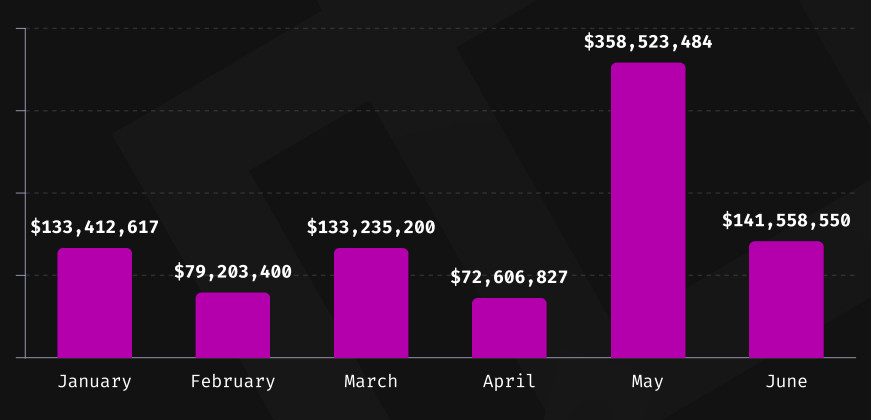The $19.7 Billion Bitcoin Arena: BlackRock's ETF Surge and the Rise of Online Fraud
In Brief
BlackRock, known as the world's largest asset manager, has taken significant strides in the realm of Bitcoin and Ethereum ETFs. Despite this major progress, the firm has issued warnings to clients about the increasing prevalence of scams targeting ETF investors.

There has been a notable uptick in scams associated with investments, particularly those redirecting individuals to dubious cryptocurrency investment sites and social media platforms like WhatsApp and Telegram. We advise caution when interacting with anyone or anything that claims affiliation with our brand.
The Rise of BlackRock’s Crypto ETFs
the firm’s IBIT has achieved an impressive $19.7 billion in Bitcoin inflows. This rapid growth places IBIT ahead of all nine other U.S.-approved ETF offerings combined regarding total inflows. The success of BlackRock's cryptocurrency ETFs underscores a heightened appetite among both institutional and retail investors for compliant cryptocurrency investment options. At the recent Bitcoin 2024 conference,
Robert Mitchnick shared valuable insights on customer inclinations. Mitchnick noted a discernible lack of interest in cryptocurrencies outside Bitcoin and Ether, yet expressed that there is significant interest in these two. With many investors gravitating toward Bitcoin, he estimates that around 20% of cryptocurrency allocations could be directed towards Ethereum.
Recent statements from BlackRock's CEO Larry Fink further emphasize this shift in investor sentiment. Initially cautious about cryptocurrencies, Fink has since dubbed Bitcoin as 'digital gold' and recognized it as a legitimate financial asset. He highlighted Bitcoin's potential for providing returns that are not correlated with traditional market fluctuations, making it appealing for investors amidst economic uncertainty and inflation.
As the popularity of BlackRock's cryptocurrency services rises, scammers have turned it into a prime target. On July 29, BlackRock issued a warning about a surge in fraudsters impersonating their representatives on social media, particularly aimed at investors interested in BlackRock's Bitcoin and Ethereum ETFs. These con artists may entice victims with exaggerated claims of investment opportunities or education. They often direct unsuspecting individuals to phony websites that present various cryptocurrency investment options or to communication platforms like Telegram and WhatsApp. BlackRock has stated categorically that it never solicits funds from users on social media or offers investment opportunities in that manner. Investors are urged to remain vigilant and avoid engaging with entities masquerading as BlackRock.
The Crypto Scam Epidemic in 2024
The increase in scams targeting BlackRock investors is part of a broader trend plaguing the cryptocurrency market. The industry suffered an estimated loss of $509 million due to fraud and cyberattacks in Q2 of 2024, a staggering 91% rise compared to the same period last year,
according to reports from Immunefi, a bug bounty platform focused on Web3.
In May 2024 alone, losses reached $107 million—the highest monthly total ever recorded. While BlackRock investors have been prominently targeted, scammers are expanding their focus. Numerous fraudulent schemes and security breaches have emerged throughout the cryptocurrency landscape. For instance, a blockchain investigator known as Wazz recently cautioned the public regarding the Ethereum-based Neiro token, labeling it as a potential honeypot fraud. Although the initial investigation yielded no conclusive results, multiple red flags related to on-chain activities and the developers' lack of transparency were raised.

Photo: Crypto loses, Immunefi
The Broader Landscape of Crypto Scams
This scheme manages to bypass most automated detection tests but constantly interacts with AutomatedMarketMaker(), which alters the transfer() function, likely blacklisting any new investors.
In a separate high-profile case, the SEC has charged Andrew Left, founder of Citron Research, with securities fraud.
There have also been instances of hacking within the Bitcoin community. Recently, a hacker from the UK was sentenced to three and a half years in prison for using phishing schemes that compromised over 500 Coinbase accounts between 2018 and 2019. After stealing more than $900,000, this individual, who was between 17 and 18 years old at the time, pleaded guilty to conspiracy to commit fraud and money laundering.
Crypto Regulatory Challenges and Industry Response Elliot Gunton Global regulatory bodies are increasingly aware of the wave of scams and fraudulent activities associated with cryptocurrencies. The SEC, in particular, has ramped up its enforcement on those allegedly violating securities laws concerning digital currencies. The regulatory body's efforts to safeguard market integrity across multiple investment sectors, including cryptocurrencies, are exemplified by their case against Andrew Left.
In light of these challenges, many cryptocurrency exchanges and investment platforms have bolstered their security measures and implemented stricter Know Your Customer (KYC) and Anti-Money Laundering (AML) practices. Nevertheless, the decentralized nature of various coins and the rapid pace of technological evolution in the industry still present significant hurdles for regulators and market participants.
BlackRock has taken a proactive approach to address the growing issue of fraud. The firm has initiated legal action against the owners of fraudulent entities pretending to represent BlackRock, in addition to alerting the investment community.
These counterfeit websites, some of which were specifically associated with cryptocurrency investments, were designed to deceive investors.
One notable example was a fictitious application for an XRP exchange-traded fund called 'BlackRock iShares XRP Trust.'
This situation caused a temporary spike in XRP's price and compelled BlackRock to issue a statement clarifying the application’s fraudulent nature. The Future of Cryptocurrency Investments and Security In the coming years, regulatory compliance in the cryptocurrency sector is likely to be emphasized further. Traditional financial institutions bring established risk management practices and regulatory frameworks into the market, which could help professionalize the industry and create a safer environment for investors.
However, the unique characteristics of cryptocurrencies – such as their decentralized structure, pseudonymous transactions, and rapid technological advancements – will continue to pose challenges. Investors need to be cautious and educate themselves about the risks inherent in cryptocurrency investments, including the potential for fraud and deceit.
The role of technology in combating cryptocurrency scams is also expected to grow. Advanced technologies like machine learning algorithms, AI, and distributed ledger analytics are being developed to detect suspicious behavior and protect investors. These technological advancements could pave the way for a more secure investment environment in crypto, alongside improved regulatory measures and best practices within the industry.
Please remember that the information shared on this page is not intended and should not be taken as legal, tax, investment, financial, or any other form of advice. It’s crucial to invest only what you can afford to lose and to seek independent financial counsel if you have any uncertainties. For more insights, we recommend reviewing the terms and conditions as well as the support resources provided by the issuer or advertiser. MetaversePost is dedicated to providing accurate and unbiased reporting, though market conditions can change without prior notice.
Victoria writes on various technology subjects, including Web3.0, AI, and cryptocurrencies. Her vast experience allows her to produce insightful articles for a broad audience.
Disclaimer
In line with the Trust Project guidelines Binance Completes USDC Integration on Sonic Network, Deposit Support Now Available







